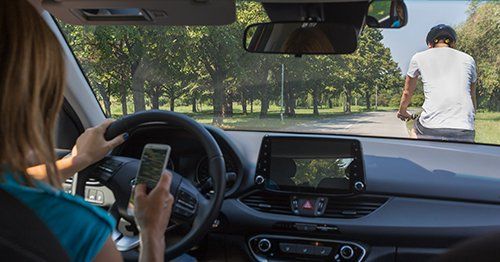BLOG
Myths About Distracted Driving | Law Offices of Burton J. Hass
- By Admin
- •
- 17 Dec, 2018
- •

In 2015, 10 percent of fatal car accidents and 15 percent
of nonfatal crashes were caused by a distracted driver. As technology becomes more
portable and cars are equipped with more gadgets, drivers are finding more reasons than ever to take their eyes off the road.
Here are a few common myths about distracted driving.
portable and cars are equipped with more gadgets, drivers are finding more reasons than ever to take their eyes off the road.
Here are a few common myths about distracted driving.
Massachusetts Has No Cell Phone Driving Laws
Chatting on the cell phone while rushing to work or school is a common occurrence. You see people doing it all the time without repercussions,
so you might assume there are no laws concerning the use of cell phones while driving. In Massachusetts, anyone 18 and older must keep one
hand on the wheel while driving and talking on the phone.
Teen drivers under 18 must keep both hands on the wheel, meaning they cannot use their cell phone at all while driving. Texting while driving is
illegal in Massachusetts, no matter what a person's age. It is also illegal for individuals to answer emails, surf the internet, or use their phones for
anything other than talking while they are driving.
However, if you were injured in an accident by an individual on their cell phone and they had one hand on the wheel, your attorney could argue
that the cell phone use impaired their ability to drive safely.
so you might assume there are no laws concerning the use of cell phones while driving. In Massachusetts, anyone 18 and older must keep one
hand on the wheel while driving and talking on the phone.
Teen drivers under 18 must keep both hands on the wheel, meaning they cannot use their cell phone at all while driving. Texting while driving is
illegal in Massachusetts, no matter what a person's age. It is also illegal for individuals to answer emails, surf the internet, or use their phones for
anything other than talking while they are driving.
However, if you were injured in an accident by an individual on their cell phone and they had one hand on the wheel, your attorney could argue
that the cell phone use impaired their ability to drive safely.
Most Drivers Are Distracted by Their Cell Phone
If you've recently been injured by a distracted driver, you might assume they were on their cell phone. However, drivers can be distracted in a
number of ways while on the road, and many have nothing to do with technology. Driving distractions are divided into three categories: visual,
cognitive, and manual.
Visual distraction refers to taking your eyes off the road. This can be anything from a driver checking on their kids in the back seat to changing the directions on the car's navigation system.
Manual distraction occurs when both hands leave the wheel, such as when a driver is eating or texting.
The last distraction, cognitive distraction, refers to any action that takes a driver's mental focus away from the road. Road rage is a common
example of cognitive distraction.
number of ways while on the road, and many have nothing to do with technology. Driving distractions are divided into three categories: visual,
cognitive, and manual.
Visual distraction refers to taking your eyes off the road. This can be anything from a driver checking on their kids in the back seat to changing the directions on the car's navigation system.
Manual distraction occurs when both hands leave the wheel, such as when a driver is eating or texting.
The last distraction, cognitive distraction, refers to any action that takes a driver's mental focus away from the road. Road rage is a common
example of cognitive distraction.
Distracted Driving Is Difficult to Prove
If you or a loved one was involved in a motor vehicle accident and you believe the cause was distracted driving, take the first step to prove your
case and hire an attorney. You can also do other things to help your attorney successfully win your lawsuit, including:
case and hire an attorney. You can also do other things to help your attorney successfully win your lawsuit, including:
- Monitor social media. Check the driver's social media account. They may accidentally divulge information about the accident, including that they were distracted while it occurred.
- Snap photos of the accident. Right after the accident, take several photos that might suggest the driver was distracted. For example, if you don't see any skid marks, the driver likely did not brake before the accident.
- Talk to witnesses. Interview witnesses and inquire if they saw the other driver using their phone, eating or looking at their kids in the back seat before the accident.
Your attorney will gather additional evidence about the case. For example, depending on the specifics of the case, your attorney might ask nearby stores or banks to provide security camera footage.
The driver's purchases before the accident and the state of their vehicle can also be used as evidence. If multiple fast food wrappers were in the
vehicle at the time of the accident, for example, the attorney can argue the driver was eating rather than paying attention to the road.
Distracted driving is an epidemic that claims of lives of thousands of Americans each year. If you were recently involved in an accident and you
believe the driver was distracted, contact the professionals at the Law Offices of Burton J. Hass.
The driver's purchases before the accident and the state of their vehicle can also be used as evidence. If multiple fast food wrappers were in the
vehicle at the time of the accident, for example, the attorney can argue the driver was eating rather than paying attention to the road.
Distracted driving is an epidemic that claims of lives of thousands of Americans each year. If you were recently involved in an accident and you
believe the driver was distracted, contact the professionals at the Law Offices of Burton J. Hass.

Bicycles are hard to see and require no training or license to ride, making for extremely dangerous situations. According to the Pedestrian and Bicycle Information Center, nearly one-third of serious accidents involving bicycles also involve contact with vehicles.
While things like wearing a helmet, wearing protective gear, and using lights on your bicycle at night can help keep you safer when you ride, accidents are still a possibility. When they do happen, the information here will help you know better what to do to protect yourself physically and financially.
While things like wearing a helmet, wearing protective gear, and using lights on your bicycle at night can help keep you safer when you ride, accidents are still a possibility. When they do happen, the information here will help you know better what to do to protect yourself physically and financially.








